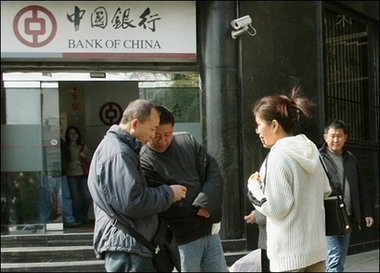China pushes rural banking to stimulate jobs
(Reuters)Updated: 2007-02-18 15:36
ZHUOZHOU - Zhang Yulong and his brothers thought they'd be rolling in cash if they'd been able to borrow from a bank to finance a string of business ideas.
 Chinese blackmarket moneychangers trade foreign currency with two customers outside a branch of the Bank of China in Shanghai. [AFP]  |
In Zhuozhou, a county town a couple of hours' drive southwest of Beijing, few manage to borrow from local banks, which prefer to lend to state firms or well-connected clients.
Turning to unlicensed lenders would have meant paying far higher interest rates than Zhang, 56, could stomach.
"We've missed out because we had few places to go for funds. If we'd been able to borrow from a bank, we could have struck gold by now," he said.
Similar complaints are heard across rural China, a loose phrase that encompasses dirt-poor villages and townships as large as mid-sized European cities. The collection of towns and villages that make up Zhuozhou, little more than parched farmland a decade ago, has a population of more than half a million.
China has long struggled to channel lending to rural China, from which mainstream banks have largely retreated.
But now that the big city-oriented state banks have been more or less nursed back to health, the central government is switching gears and backing an array of initiatives to build a system of rural finance that can stimulate jobs and growth.
The role of financial institutions in building a "new socialist countryside," with the aim of narrowing an alarming income gap between town and country, will feature prominently during next month's annual session of parliament.
There is much to do: rural China is home to less than one sixth of all bank branches, which accounted for 15 percent of the nation's combined deposits and loans as of late 2006.
Cities get 10 times more loans per head than the countryside, where more than 60 percent of China's 1.3 billion people live.
In Zhuozhou, the appetite for loans is evident. Liu Boxin, a peasant, says he'd gladly add to his sole pig and three grubby goats if only he could raise the funds.
LANDMARK CHANGES
To address the issue, the government has begun to overhaul Agricultural Bank of China, one of the country's biggest commercial lenders, and is setting up a new postal bank with a remit to lend principally to farmers and rural enterprises.
| 1 | 2 |  |
|
||
|
||
|
|